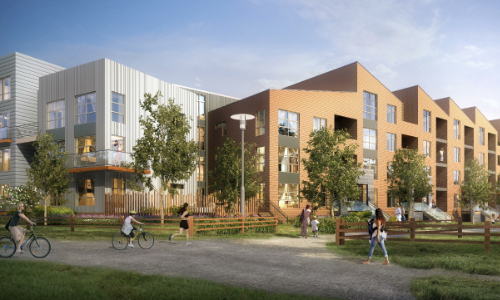Pursuing all opportunities to provide more housing to current students and help reduce the local housing crisis, UC Santa Cruz will house up to 400 upper-division undergraduate students and more than 60 employees at a soon-to-be-constructed apartment complex to be built by a private developer, pending final review by the UC Board of Regents.
The housing development on Delaware Avenue is just a few miles from the residential campus with excellent access to existing Metro and campus transit routes, as well as the Coastal Rail Trail. It is also near several other UC Santa Cruz facilities, including the Coastal Science Campus, the Westside Research Park, and the Institute of the Arts and Sciences. UC Santa Cruz will lease the buildings from Redtree Partners, which owns and is constructing the project. The apartments will be built using prevailing wage, ensuring good jobs for workers.
“We are doing all we can to provide our students with the tools and resources they need to succeed and thrive. That starts with having a safe and reliable place to live,” Chancellor Cynthia Larive said. “We are grateful for the city’s partnership and support. We are excited at the opportunity to serve our students and support our employees while reducing impacts on the local housing market.”
Larive said she is appreciative of the vote by the Santa Cruz City Council on Tuesday, April 30, confirming the changes necessary to allow the project to move forward, and thanked Mayor Fred Keeley for bringing the parties together for a successful outcome for this important housing project.
Pending final approvals, construction is expected to start in summer 2024 and be completed by fall 2026.
UC Santa Cruz provides housing for more than half of its undergraduate students. While this is one of the highest percentages in the University of California system, campus leaders say it is not enough and are relentlessly pursuing opportunities to provide housing for thousands of students.
Including the Delaware apartments, UC Santa Cruz has an ambitious plan to increase student housing by more than 40 percent by 2030, predominantly on the residential campus.
Campus involvement enables project to move forward
The apartment complex, made up of three five-story buildings, is part of a smart growth mixed-use planned community near the intersection of Delaware Avenue and Swift Street. The creation of housing and commercial space will continue to support the economic development of Santa Cruz.
The student housing would be about 20 percent below market rate, while the employee housing would be approximately five percent below market rate. Seven employee units will meet the City’s affordable housing designation and another twelve units will be available to moderate-income level employees.
The Delaware Addition project was approved by the Santa Cruz City Council in 2008. While the recession delayed construction, several buildings have been constructed, including one that serves as the current home of UC Santa Cruz’s Institute of the Arts and Sciences. The involvement of the campus is enabling the developer to move forward with the planned housing buildings.
Housing remains the highest priority
UC Santa Cruz’s highest priority is ensuring students have the resources needed to achieve their educational goals—and providing more housing is a critical element in this effort.
A revitalization of Kresge College, one of the 10 residential colleges at UC Santa Cruz, is well underway. The first phase opened in September 2023 and is providing housing for 400 undergraduate students. The final phase of the project is expected to be completed in late 2025, and will ultimately provide housing for 993 undergraduates, about 600 more than the residential college originally held.
Additional student housing that will provide housing for 3,000 students at two sites on the residential campus has been approved by the UC Board of Regents. Campus leaders anticipate that the family student housing portion of this project will be ready for occupancy as early as fall 2025, and additional housing for upper-division undergraduates and graduate students will be ready starting in the 2028-29 academic year.
To advance access to a UC Santa Cruz education for community college students, the campus is working with Cabrillo College to build a residential community focused on serving Cabrillo students and UC Santa Cruz transfer students. To be constructed at Cabrillo College, the new housing community would serve approximately 380 Cabrillo students and 240 UC Santa Cruz students. The project is receiving $111 million in state support with construction projected to start in 2025.




